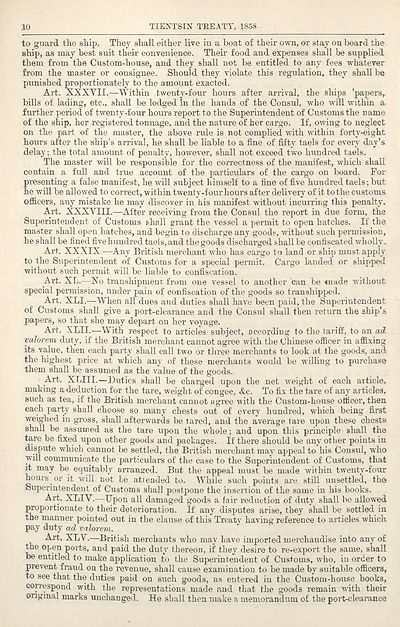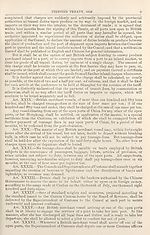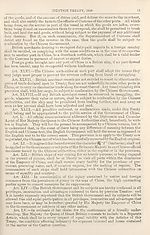1917
(90) Page 10
Download files
Complete book:
Individual page:
Thumbnail gallery: Grid view | List view

10
TIENTSIN TREATY, 1858
to guard the ship. They shall either live in a boat of their own, or stay on board the
ship, as may best suit their convenience. Their food and expenses shall be supplied
them from the Custom-house, and they shall not be entitled to any fees whatever
from the master or consignee. Should they violate this regulation, they shall be
punished proportionately to the amount exacted.
Art. XXXVII.—Within twenty-four hours after arrival, the ships ’papers,
bills of lading, etc., shall be lodged in the hands of the Consul, who will within a
further period of twenty-four hours report to the Superintendent of Customs the name
of the ship, her registered tonnage, and the nature of her cargo. If, owing to neglect
on the part of the master, the above rule is not complied with within forty-eight
hours after the ship’s arrival, he shall be liable to a fine of fifty taels for every day’s
delay; the total amount of penalty, however, shall not exceed two hundred taels.
The master will be responsible for the correctness of the manifest, which shall
contain a full and true account of the particulars of the cargo on board. For
presenting a false manifest, he will subject himself to a fine of five hundred taels; but
he will be allowed to correct, within twenty-four hours after delivery of it to the customs
officers, any mistake he may discover in his manifest without incurring this penalty.
Art. XXXVIII.—After receiving from the Consul the report in due form, the
Superintendent of Customs shall grant the vessel a permit to open hatches. If the
master shall open hatches, and begin to discharge any goods, without such pei’mission,
he shall be fined five hundred taels, and the goods discharged shall be confiscated wholly.
Art. XXXIX—Any British merchant who has cargo to land or ship must apply
to the Superintendent of Customs for a special permit. Cargo landed or shipped
without such permit will be liable to confiscation.
Art. XL.—No transhipment from one vessel to another 'can be made without
special permission, under pain of confiscation of the goods so transhipped.
Art. XLI.—When all dues and duties shall have been paid, the Superintendent
of Customs^ shall give a port-clearance and the Consul shall then return the ship’s
papers, so that she may depart on her voyage.
Art. XLII.—With respect to articles subject, according to the tariff, to an ad
valorem duty, if the British merchant cannot agree with the Chinese officer in affixing
its value, then each party shall call two or three merchants to look at the goods, and
the highest price at which any of these merchants would be willing to purchase
them shall be assumed as the value of the goods.
• Art. XLIII.—Duties shall be charged upon the net weight of each article,
making a deduction for the tare, weight of congee, &q. To fix the tare of any articles,
such as tea, if the British merchant cannot agree with the Custom-house officer, then
each party shall choose so many chests out of every hundred, which being first
weighed in gross, shall afterwards be tared, and the average tare upon these chests
shall be assumed as the tare upon the whole; and upon this principle shall the
tare be fixed upon other goods and packages. If there should be any other points in
dispute which cannot be settled, the British merchant may appeal to his Consul, who
will communicate the particulars of the case to the Superintendent of Customs, that
it may be equitably arranged. But the appeal must be made wiihin twenty-four
hours or it will not be attended to. While such points are still unsettled, the
Superintendent of Customs shall postpone the insertion of the same in his books.
Art. XLIV.—Upon all damaged goods a fair reduction of duty shall be allowed
proportionate to their deterioration. If any disputes arise, they shall be settled in
the manner pointed out in the clause of this Treaty having reference to articles which
pay duty ad valorem.
Art. XLV.—British merchants who may have imported merchandise into any of
the open ports, and paid the duty thereon, if they desire to re-export the same, shall
be entitled to make application to the Superintendent of Customs, who, in order to
prevent fraud on the revenue, shall cause examination to be made by suitable officers,
to see that the duties paid on such goods, as entered in the Custom-house books,
correspond with the representations made and that the goods remain with their
original marks unchanged. He shall then make a memorandum of the port-clearance
TIENTSIN TREATY, 1858
to guard the ship. They shall either live in a boat of their own, or stay on board the
ship, as may best suit their convenience. Their food and expenses shall be supplied
them from the Custom-house, and they shall not be entitled to any fees whatever
from the master or consignee. Should they violate this regulation, they shall be
punished proportionately to the amount exacted.
Art. XXXVII.—Within twenty-four hours after arrival, the ships ’papers,
bills of lading, etc., shall be lodged in the hands of the Consul, who will within a
further period of twenty-four hours report to the Superintendent of Customs the name
of the ship, her registered tonnage, and the nature of her cargo. If, owing to neglect
on the part of the master, the above rule is not complied with within forty-eight
hours after the ship’s arrival, he shall be liable to a fine of fifty taels for every day’s
delay; the total amount of penalty, however, shall not exceed two hundred taels.
The master will be responsible for the correctness of the manifest, which shall
contain a full and true account of the particulars of the cargo on board. For
presenting a false manifest, he will subject himself to a fine of five hundred taels; but
he will be allowed to correct, within twenty-four hours after delivery of it to the customs
officers, any mistake he may discover in his manifest without incurring this penalty.
Art. XXXVIII.—After receiving from the Consul the report in due form, the
Superintendent of Customs shall grant the vessel a permit to open hatches. If the
master shall open hatches, and begin to discharge any goods, without such pei’mission,
he shall be fined five hundred taels, and the goods discharged shall be confiscated wholly.
Art. XXXIX—Any British merchant who has cargo to land or ship must apply
to the Superintendent of Customs for a special permit. Cargo landed or shipped
without such permit will be liable to confiscation.
Art. XL.—No transhipment from one vessel to another 'can be made without
special permission, under pain of confiscation of the goods so transhipped.
Art. XLI.—When all dues and duties shall have been paid, the Superintendent
of Customs^ shall give a port-clearance and the Consul shall then return the ship’s
papers, so that she may depart on her voyage.
Art. XLII.—With respect to articles subject, according to the tariff, to an ad
valorem duty, if the British merchant cannot agree with the Chinese officer in affixing
its value, then each party shall call two or three merchants to look at the goods, and
the highest price at which any of these merchants would be willing to purchase
them shall be assumed as the value of the goods.
• Art. XLIII.—Duties shall be charged upon the net weight of each article,
making a deduction for the tare, weight of congee, &q. To fix the tare of any articles,
such as tea, if the British merchant cannot agree with the Custom-house officer, then
each party shall choose so many chests out of every hundred, which being first
weighed in gross, shall afterwards be tared, and the average tare upon these chests
shall be assumed as the tare upon the whole; and upon this principle shall the
tare be fixed upon other goods and packages. If there should be any other points in
dispute which cannot be settled, the British merchant may appeal to his Consul, who
will communicate the particulars of the case to the Superintendent of Customs, that
it may be equitably arranged. But the appeal must be made wiihin twenty-four
hours or it will not be attended to. While such points are still unsettled, the
Superintendent of Customs shall postpone the insertion of the same in his books.
Art. XLIV.—Upon all damaged goods a fair reduction of duty shall be allowed
proportionate to their deterioration. If any disputes arise, they shall be settled in
the manner pointed out in the clause of this Treaty having reference to articles which
pay duty ad valorem.
Art. XLV.—British merchants who may have imported merchandise into any of
the open ports, and paid the duty thereon, if they desire to re-export the same, shall
be entitled to make application to the Superintendent of Customs, who, in order to
prevent fraud on the revenue, shall cause examination to be made by suitable officers,
to see that the duties paid on such goods, as entered in the Custom-house books,
correspond with the representations made and that the goods remain with their
original marks unchanged. He shall then make a memorandum of the port-clearance
Set display mode to:
![]() Universal Viewer |
Universal Viewer | ![]() Mirador |
Large image | Transcription
Mirador |
Large image | Transcription
Images and transcriptions on this page, including medium image downloads, may be used under the Creative Commons Attribution 4.0 International Licence unless otherwise stated. ![]()
| Asian directories and chronicles > 1917 > (90) Page 10 |
|---|
| Permanent URL | https://digital.nls.uk/194533478 |
|---|
| Attribution and copyright: |
|
|---|---|
| Description | Volumes from the Asian 'Directory and Chronicle' series covering 1917-1941, but missing 1919 and 1923. Compiled annually from a multiplicity of local sources and research. They provide listings of each country's active corporations, foreign residents and government agencies of all nationalities for that year, together with their addresses. Content includes: various treaties; coverage of conflicts; currencies and taxes; consular fees; weights and measures; public holidays; festivals and traditions. A source of information for both Western states and communities of foreigners living in Asia. Published by Hongkong Daily Press. |
|---|---|
| Shelfmark | H3.86.1303 |
| Additional NLS resources: |

